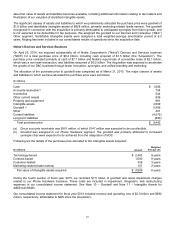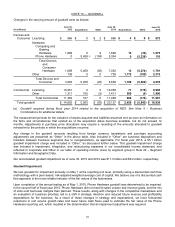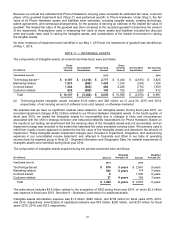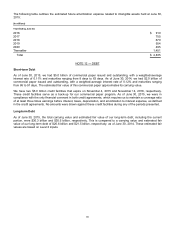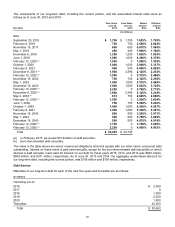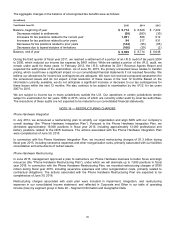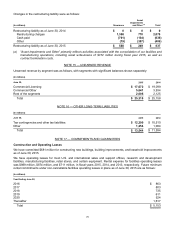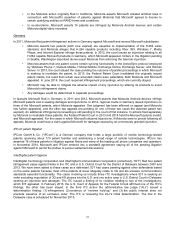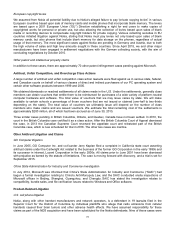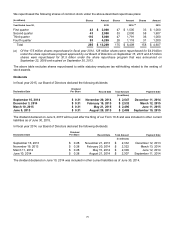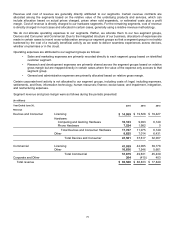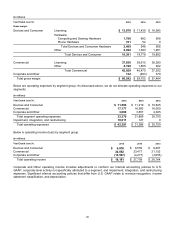Microsoft 2015 Annual Report Download - page 72
Download and view the complete annual report
Please find page 72 of the 2015 Microsoft annual report below. You can navigate through the pages in the report by either clicking on the pages listed below, or by using the keyword search tool below to find specific information within the annual report.
71
Indemnifications
We provide indemnifications of varying scope and size to certain customers against claims of intellectual property
infringement made by third parties arising from the use of our products and certain other matters. We evaluate
estimated losses for these indemnifications, and we consider such factors as the degree of probability of an
unfavorable outcome and the ability to make a reasonable estimate of the amount of loss. To date, we have not
encountered significant costs as a result of these obligations and have not accrued any liabilities related to these
indemnifications in our consolidated financial statements.
NOTE 18 — CONTINGENCIES
Patent and Intellectual Property Claims
Motorola litigation
In October 2010, Microsoft filed patent infringement complaints against Motorola Mobility (“Motorola”) with the
International Trade Commission (“ITC”) and in U.S. District Court in Seattle for infringement of nine Microsoft patents
by Motorola’s Android devices. Microsoft and Motorola have filed additional claims against each other with the ITC, in
federal district courts in Seattle, Wisconsin, Florida, and California, and in courts in Germany. The nature of the
claims asserted and status of individual matters are summarized below.
International Trade Commission
In 2012, the ITC issued a limited exclusion order against Motorola on one Microsoft patent, which was affirmed on
appeal. In 2013, Microsoft filed an action in U.S. District Court in Washington, D.C. seeking an order to compel
enforcement of the ITC’s 2012 import ban against infringing Motorola products by the Bureau of Customs and Border
Protection (“CBP”), after learning that CBP had failed to fully enforce the order.
In 2010, Motorola filed an action against Microsoft with the ITC alleging infringement of five Motorola patents by Xbox
consoles and accessories and seeking an exclusion order to prohibit importation of the allegedly infringing
Xbox products. At Motorola’s request, the ITC terminated its investigation of four Motorola patents. In 2013, the ITC
affirmed there was no violation of the remaining Motorola patent. Motorola appealed the ITC’s decision to the U.S.
Court of Appeals for the Federal Circuit.
U.S. District Court
The Seattle District Court case filed in October 2010 by Microsoft as a companion to Microsoft’s ITC case against
Motorola was stayed pending the outcome of the ITC case.
In November 2010, Microsoft sued Motorola for breach of contract in U.S. District Court in Seattle, alleging that
Motorola breached its commitments to standards-setting organizations to license to Microsoft certain patents on
reasonable and non-discriminatory (“RAND”) terms and conditions. Motorola has declared these patents essential to
the implementation of the H.264 video standard and the 802.11 Wi-Fi standard. In the Motorola ITC case described
above and in suits described below, Motorola or a Motorola affiliate subsequently sued Microsoft on those patents in
U.S. District Courts, in the ITC, and in Germany. In 2012, the Seattle District Court granted a partial summary
judgment in favor of Microsoft ruling that (1) Motorola had committed to standards organizations to license its
declared-essential patents on RAND terms and conditions; and (2) Microsoft is a third-party beneficiary of those
commitments. After trial, the Seattle District Court set per unit royalties for Motorola’s H.264 and 802.11 patents,
which resulted in an immaterial Microsoft liability. In 2013, following trial of Microsoft’s breach of contract claim, a jury
awarded $14.5 million in damages to Microsoft. Motorola appealed with respect to both the Court’s determination of
royalties due Motorola and the jury’s award of damages against Motorola; in July 2015 the U.S. Court of Appeals for
the Ninth Circuit affirmed the trial court’s judgment in all respects.
Cases filed by Motorola in Wisconsin, California, and Florida, with the exception of one case in Wisconsin initially
stayed and later dismissed without prejudice (a companion case to Motorola’s ITC action), have been transferred to
the U.S District Court in Seattle. Motorola and Microsoft both seek damages as well as injunctive relief. The court has
stayed these cases in Seattle on agreement of the parties.
• In the transferred cases, Motorola asserts 15 patents are infringed by a range of Microsoft products
including mobile and PC operating system, productivity, server, communication, browser and gaming
products.


